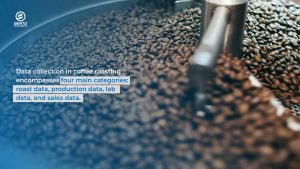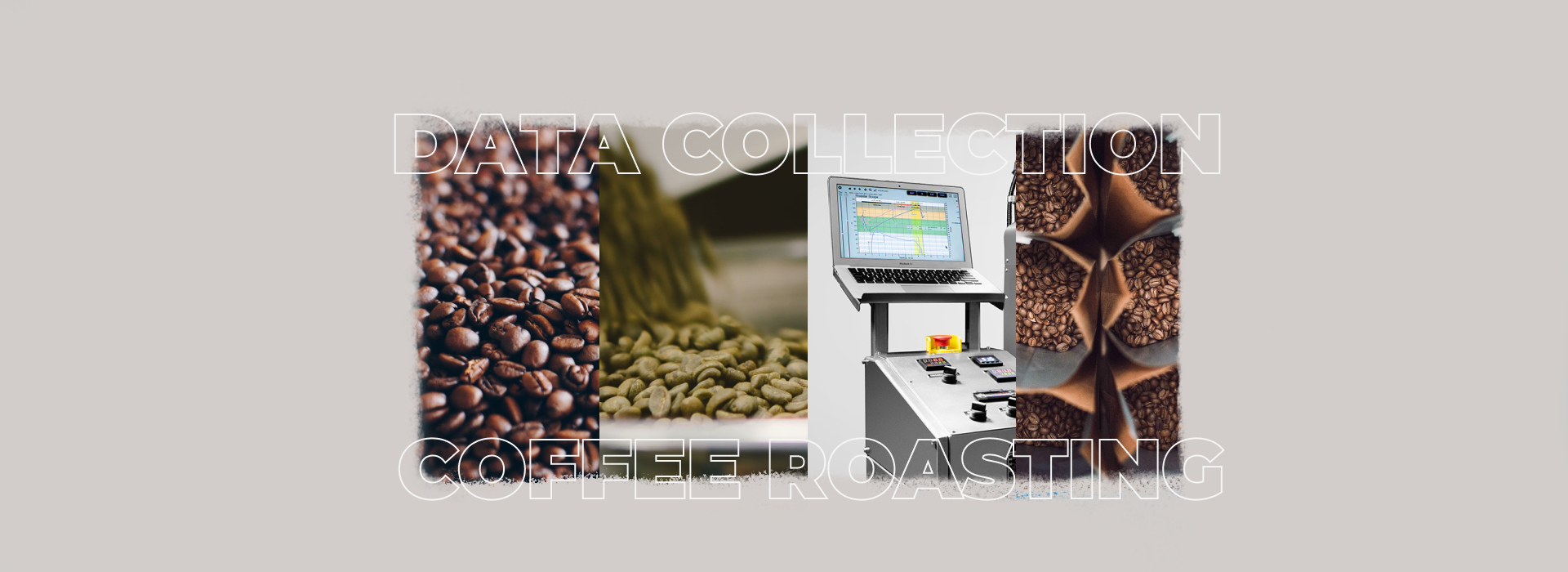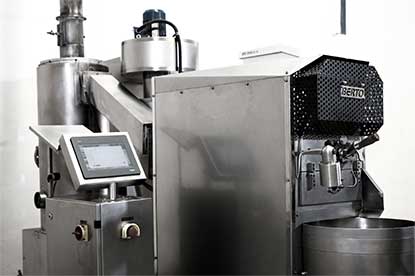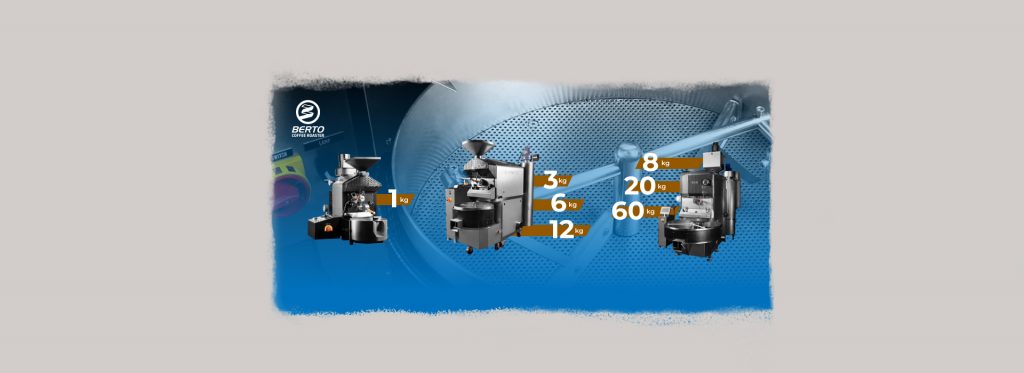Why is Data Collection in Coffee Roasting Important?
Data collection plays a pivotal role in the success of coffee roasters of any size. By gathering and analyzing relevant information, roasters gain valuable insights that drive informed decision-making and enable them to stay ahead in the competitive coffee industry. The great news is today’s roasting technology and specialized software make it easier for anyone to manage data for coffee roasting.
Let’s explore why data collection is essential in your coffee roasting journey. What should you collect and why?
Data collection in coffee roasting encompasses four main categories: roast data, production data, lab data, and sales data.
Roast Data
Roast data is about keeping track of temperature changes during roasting. This includes recording temperature measurements over time, noting any adjustments made to control the roast, and tracking how long it takes for the temperature to reach important ranges. We can also collect other information based on temperature tracking, such as how quickly the temperature changes or differences in temperature between different parts of the roaster. We can also capture additional sensor data like color, air pressure, or velocity.
Production Data
Production data include important information about buying green coffee beans and specific details such as which roaster handled which batch, the date and time it was roasted, the amount of a particular type of green coffee used, and the quantity of roasted coffee produced.
Lab Data
Lab data analyzes different aspects of green, roasted, or finished coffee products. This includes evaluating the taste through cupping, assessing the quality of green coffee, and measuring physical characteristics like moisture content, density, color, and particle size distribution when the coffee is ground. Additional lab data may include comparing brewed coffee against sensory standards through cuppings and other sensory specifications.
Sales Data
Sales data provides insights into customer purchasing behavior, including who buys which coffees and the frequency of their purchases. It may also involve monitoring sales patterns during promotions or events that could impact sales.

What Are Some Examples of Data You Need to Collect?
First Crack data
First Crack is a cracking sound that occurs when the beans enter an exothermic reaction, usually at about 196°C (385°F). It denotes the start of the “light roast” stage, crucial for aroma and flavor development.
By recording this event, roasters can better understand how the coffee is progressing during the roast, allowing for better control over the flavor profile. This data is particularly useful when roasting new coffee beans, as it helps roasters quickly learn how the coffee reacts and develops. It can also be used for future batches to achieve consistency by preparing for the First Crack. However, it can be challenging to consistently register First Crack during every roasting session, as it may not always happen at the expected time. Factors like starting temperature and environmental conditions can affect its timing.
Essential Temperature Sensors
The importance of temperature sensors lies in their ability to monitor and track the precise temperatures at various stages of roasting, such as the drying phase, Maillard reaction, and the onset of the First Crack.
Firstly, it helps coffee roasters ensure consistency and repeatability in their roasting process. By closely monitoring the temperature changes, roasters can replicate successful roast profiles and maintain consistent quality across different batches. This is particularly crucial for specialty coffee roasters who strive to deliver consistent flavor profiles to meet the expectations of their customers.
Temperature data collection also enables roasters to optimize the flavors and aromas of the coffee. Different temperature ranges during roasting contribute to the development of specific flavor characteristics. By carefully analyzing the temperature data, roasters can identify the ideal temperature ranges for achieving desired flavor profiles, such as acidity, sweetness, body, and aroma. This knowledge empowers them to adjust their roasting parameters precisely and create coffees with distinctive and enjoyable taste profiles.
The temperature sensors also aid in the detection and prevention of undesirable outcomes in the roasting process. For example, monitoring the temperature trends can help roasters identify potential issues like scorching, underdevelopment, or over-roasting. This allows for timely interventions and adjustments to maintain optimal roasting conditions and avoid undesirable flavors or defects in the final coffee.
The various commonly used sensors are bean, air, exhaust, and drum sensors.
Why Do We Need to Collect Data?
Data Collection for Quality Control
Data collection is a crucial aspect of ensuring consistent coffee quality.
You can identify patterns and correlations that directly impact the final brew. By understanding how each parameter affects the flavor, aroma, and overall characteristics of the coffee, you will learn to fine-tune and perfect your desired roast profiles accordingly.
With this precise control over the roasting process, you can maintain a high-quality standard and deliver exceptional coffee beans that consistently meet your expectations. From the initial selection of green beans to the final cupping, data collection provides roasters with the necessary information to optimize their roasting techniques and ensure that every batch of coffee offers an all-around exquisite sensory experience.
Traceability and Transparency
Data collection promotes traceability and transparency within the coffee industry. By collecting data on coffee origins, farming practices, and supply chain information, roasters can ensure ethical sourcing, support sustainability efforts, and meet consumers’ growing demand for transparency. Transparent data allows roasters to communicate the journey of their coffee beans, building trust with customers.
Evaluate the Effectiveness of Data
Regularly assessing your data collection methods and their usage is crucial. As your business expands, new challenges may arise that require different information. Advancements in technology also enable previously impractical approaches.
Acknowledging that some collected data may not prove as useful as initially anticipated is important. If certain data proves unhelpful or strongly correlates with easier-to-measure metrics, it may be wise to discontinue collecting it. Engaging in overly burdensome data collection is unlikely to yield accurate and consistent results, thus diminishing its value in providing meaningful insights.
Remember, the ultimate purpose of data collection and analysis is to drive operational benefits. Effective data practices should improve operational efficiency, consistent production, enhanced cash flow, and increased sales. Furthermore, it should simplify the planning of purchasing and production processes. Integrating data entry and analysis into tasks is essential for accurate and efficient execution.
Data collection is a powerful tool, but its true value lies in its effectiveness!
With the Berto Type R Roaster, you can monitor and control everything manually on one screen, with an option to pre-program the roast progress in Recipe mode for a fully automated batch. Learn more about our roasters or contact us to find your perfect fit.



